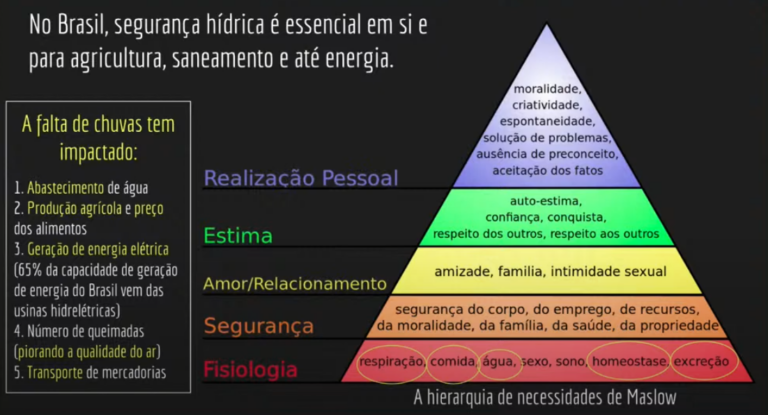
 This is our latest article in a series created in partnership with the Behner Stiefel Center for Brazilian Studies at San Diego State University, to produce articles for the Digital Brazil Project on climate impacts and affirmative action in the favelas for RioOnWatch.
This is our latest article in a series created in partnership with the Behner Stiefel Center for Brazilian Studies at San Diego State University, to produce articles for the Digital Brazil Project on climate impacts and affirmative action in the favelas for RioOnWatch.
The environmental crisis that the planet is facing has had an impact on all aspects of our lives, even if we don’t yet recognize it as a source of these challenges, as is the case of the water crisis that has hit Brazilians hard this year. Despite being the country with the largest reserves of fresh water on the planet, and one which is typically seen as low-risk for water crises, Brazil just experienced the its worst drought in 91 years. The situation is predicted worsen, with dry conditions well into 2022. Reservoirs are currently at a low across the country, while demand for water is growing. In addition, the water crisis has a direct impact on sanitation and on the country’s energy generation, since over 60% of Brazil’s electricity is produced through hydroelectric plants, inevitably impacting the economy as a whole and electric bills nationwide.
In response to the situation, the federal government created a drought management committee known as the Chamber of Exceptional Rules for Hydropower Management (CREG). The committee announced the creation of a new tariff band named the “water scarcity tariff” which will increase household electric bills at least until the end of the drought in 2022. The effects of this new tariff are already known and have been widely discussed by Brazilians: with electric bills going up, food and public services also get more expensive, and as a result the general cost of living grows even more unsustainable. As is always the case in unequal countries like Brazil, the most affected are the poorest, often favela residents, who already experience multiple crises. Policies shift the damages to the general public, when what they should be doing is intervening to reduce impacts on the average person, by putting limits on large corporations that not only use a lot of water for irrigation and industry but contaminate it through an authorized increase and use of agrochemicals. Water insecurity is linked to food insecurity.

Water scarcity can be analyzed at different levels: at the global level, which is represented by more prolonged and severe weather impacts; at the national level, comprising impacts on different Brazilian biomes such as the Amazon, the Cerrado and the Caatinga; at the river basin level, reflecting the lack of protection of springs, riparian zones, and soil degradation; and at the municipal level, where sanitation actually occurs and which should be evaluated both by the supply of water and consumer demand. It is at this last level that we must focus when it comes to climate justice during water crises, since it is here that we see the impacts of water issues on the physiological necessities of people, which is to say, the bare minimum that we need to live.

The water crisis is a constant reality in many favelas, a situation worsened during the Covid-19 pandemic when people lacked access to the necessary level of personal hygiene to protect themselves from virus transmission. Water insecurity tends to amplify the impacts of inequality in the country. The hunger, power outages and lack of sanitation that favelas have always dealt with, exacerbated and made more visible by the pandemic, are further deepened by the recurrence and intensity of water crises. The increase in the price of cooking gas also brought new hardships for families, who had to use alternative methods to prepare their meals. In 2010, the United Nations (UN) General Assembly passed Resolution 64/292, recognizing water and sanitation as a human right with a favorable vote from the Brazilian delegation. This means that Brazil committed to developing public policies that would result in access to water, considering both the quantity and quality of access, as well as adequate sanitation services for all.

However, due to such marked neglect perpetrated by the State, favelas have been forced to find their own responses to these problems. Necessity turns them into protagonists. Actions taken by favelas on their own have been so noteworthy that they became a major focus of international media coverage during the pandemic. When the pandemic began, thousands of community groups that were originally created for a range of different purposes used their organizational skills to respond to the basic needs of residents. The Serra da Misericórdia Integration Center, Complexo da Penha‘s CEM, an agroecology project that has been in operation for years in Rio’s North Zone, switched its focus during the pandemic to helping the local population survive by providing it with agroecological foodstuffs. The Kennedy Brothers Community Center (CCIK), which has offered its facilities for decades for courses, sports, workshops and numerous other activities, changed its focus to provide Vila Kennedy residents with baskets of basic foodstuffs, hygiene products and education about the virus.

The context surrounding environmental laws in Brazil is also alarming. This year’s Proposed Bill 2159, has been approved in Brazil’s Chamber of Deputies and is currently being debated in the Senate, on its way to becoming a law. The bill was submitted over 20 years ago to propose a general environmental legal framework, but today’s bill barely resembles the original text and goes completely against what specialists and social and environmental groups have been advocating. If approved, this bill would represent the dismantling of existing environmental protection policies. The only beneficiaries of this new law would be corporations, in the short term, which are focused on the reproduction of, and unlimited accumulation of capital, going against the nation’s natural capacity. The outcome would be catastrophic for the environment and consequently for Brazilians, who would be even more neglected by the State.
In general, the proposed bill increases the socio-environmental vulnerability of favela residents, of the countryside, forests and water sources. Regarding indigenous and traditional peoples and communities, the bill would aggravate the already delicate situation they are facing in Brazil, because the regulations would not cover indigenous lands which are not yet fully demarcated, as well as lands that are not officially titled quilombola territories. The proposed bill would not only be unconstitutional but also contradictory for public administration, since it is the State’s own responsibility to recognize land occupied by indigenous and traditional communities. Consequently, this dereliction of duty by the State could result in serious conflicts and the violation of indigenous and quilombola communities’ human rights, leading to serious socio-environmental and public health impacts for the general population.
Learn More:
About the Authors:
Alexandre Pessoa graduated in Civil Engineering from the State University of Rio de Janeiro (UERJ) in 1996, specializing in Sanitation. He has a doctorate in Tropical Medicine from IOC/Fiocruz (2017), a master’s in Environmental Engineering from UERJ (2003) and a specialization in Sanitation and Environmental Management from the Sergio Arouca School of Public Health – ENSP/Fiocruz (2000). With a specialization in Sanitation and Environmental Engineering from UERJ (1997), Pessoa is a civil servant for the Oswaldo Cruz Foundation, Ministry of Health, assigned to the Joaquim Venâncio Polytechnic School of Health (EPSJV/Fiocruz). He coordinates Fiocruz’s Water and Sanitation Working Group and is a member of the Health and Environment WG at the Brazilian Association of Collective Health (Abrasco).
Gabriela Buffon Vargas is an architect and urban planner with a master’s degree in International Cooperation and Urban Planning from the Grenoble Alpes University (UGA). She is a member of the Sustainable Favela Network team, working as impact and reporting manager.
Theresa Williamson has a doctorate in urban planning from the University of Pennsylvania and is Executive Director of Catalytic Communities, the NGO that publishes RioOnWatch, coordinates the Sustainable Favela Network and Favela Community Land Trust program, and manages the Covid-19 in Favelas Unified Dashboard.
